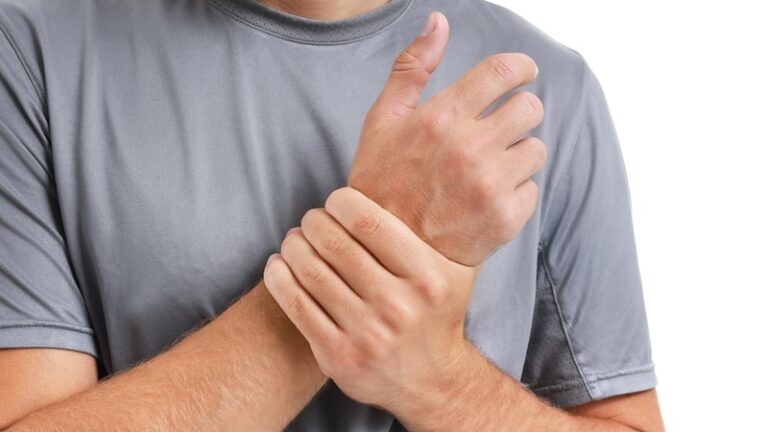Alcoholic numbness is a common yet often overlooked symptom of alcohol abuse, signaling nerve damage caused by chronic alcohol consumption.
This condition primarily affects the peripheral nerves, which are responsible for sensations in the limbs. Long-term alcohol use affects nerve function. This can cause alcoholic numbness in the feet and hands. Without proper treatment, this condition can get worse.
We will look at the causes, symptoms, diagnosis, and treatment of alcoholic numbness. This will help us understand how to manage this condition effectively.
Questions answered in this article:
Our Addiction Treatment Programs

Scottsdale Rehab
Luxury Personalized Rehab

HART Rehab
Holistic Luxury Personalized Rehab

Scottsdale Detox
Luxury Medical Detox
What is Alcoholic Numbness?
Alcoholic numbness is a type of nerve damage called alcoholic neuropathy. It happens from too much alcohol intake for a long time.
Alcohol and its harmful byproducts can hurt the peripheral nerves. This often leads to a loss of feeling, tingling, pins and needles or pain, usually in the feet and hands. The condition may begin with mild numbness from alcohol.
If not treated, it can lead to worse symptoms. These include muscle weakness and trouble with coordination. The damage to the nerves comes from several factors. These include the harmful effects of alcohol, lack of nutrients, and changes in metabolism from long-term drinking.
Causes of Alcoholic Numbness
Several factors contribute to the development of alcoholic numbness, primarily related to long-term alcohol abuse:
- Direct Toxicity: Alcohol and its metabolites have a direct toxic effect on the central nervous system and peripheral nerves. Over time, the buildup of these toxins in the body causes nerve damage, leading to symptoms like alcoholic numbness.
- Nutritional Deficiencies: Chronic alcohol use interferes with the absorption of vital nutrients, especially B vitamins such as thiamine (vitamin B1) and vitamin B12. A thiamine deficiency is particularly harmful, as it is essential for nerve function. This lack of nutrients weakens the nerves, resulting in alcoholic numbness.
- Metabolic Changes: Chronic alcohol consumption alters metabolic processes in the body, which can contribute to nerve damage. Conditions such as peripheral neuropathy are more common among individuals with a history of heavy drinking.
Symptoms of Alcoholic Numbness
Alcoholic neuropathy is nerve damage that happens from drinking alcohol over a long time. It often starts with numbness in the hands and feet, but as it gets worse, it can cause other symptoms.
- Hand numbness after drinking alcohol
- Loss of sensation or tingling in extremities
- Burning or stabbing pain in hands and feet
- Muscle weakness, especially in lower limbs
- Difficulty walking or maintaining balance
- Coordination issues, increasing fall risk
- Digestive problems like constipation or diarrhea
- Trouble regulating body temperature and excessive sweating
As alcoholic numbness gets worse, it can make it harder to move around and affect daily life. Stopping alcohol use and getting the right vitamins can help manage these symptoms and may improve nerve health.
How to Diagnose Alcoholic Numbness?
Diagnosing alcoholic numbness involves a thorough evaluation by a healthcare professional, including the following methods:
- Medical History and Physical Exam: The doctor will review alcohol use and check for signs of numbness or muscle weakness.
- Blood Test: Blood work can detect nutritional deficiencies, like low thiamine, and metabolic changes from alcohol use.
- Electrodiagnostic Tests: Nerve conduction studies assess nerve function to confirm peripheral neuropathy and determine the extent of damage.
Treatment Options for Alcoholic Numbness
While alcoholic neuropathy can’t always be fully reversed, early treatment can prevent further nerve damage and improve quality of life.
1. Stop Drinking Alcohol
The most important step in treating alcoholic numbness is to completely stop alcohol use. Continuing to drink will make nerve damage worse.
2. Address Nutritional Deficiencies
Since thiamine deficiency is a major cause of alcoholic neuropathy, taking vitamin B1, B12, and folate can help restore nerve function.
3. Pain Management
Pain from nerve damage can be managed with:
- Anticonvulsant medications
- Antidepressants (used for nerve pain)
- Over-the-counter pain relievers
4. Physical Therapy
A physical therapist can create a treatment plan to help:
- Strengthen muscles
- Improve balance and coordination
- Prevent further mobility issues
5. Healthy Lifestyle Changes
Adopting a healthy lifestyle is crucial for nerve health:
- Balanced diet (rich in vitamins and nutrients)
- Regular exercise
- Adequate sleep
Support Resources for Alcoholic Numbness
Recovery from alcoholic numbness requires both medical care and emotional support. Support groups like Alcoholics Anonymous (AA) offer guidance and encouragement to help people stay sober. You can reach out by calling the Alcoholics Anonymous phone number for assistance.
There are also treatment centers that provide:
- Luxury rehabilitation programs
- Holistic addiction treatment
- Medical detox programs
These alcohol rehab centers can help individuals safely quit drinking and manage alcoholic neuropathy symptoms. Taking a tour of a rehab facility can help you explore the best recovery options for your needs.
Get Help For Alcoholic Numbness
Alcoholic numbness is a key symptom of alcoholic neuropathy, a serious mental health condition caused by long-term alcohol abuse. If left untreated, it can lead to permanent nerve damage and disabilities.
But recovery is possible. By quitting alcohol, improving nutrition, managing pain, and staying active, people with alcoholic neuropathy can regain control over their health.
For more tools and insights on managing recovery, visit Recovery Calculators. Taking action today can prevent further damage and improve your quality of life.


